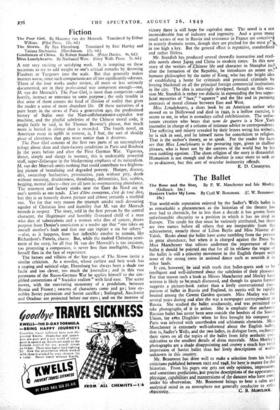Fiction
The Poor Girl. By Maxence van der Mecrsch. Translated by Eithne Wilkins. (Pilot Press. 12s. 6d.) The Storm. By Ilya Ehrenburg. Translated by Eric Hartley and Tatiana Shebunina. (Hutchinson. 12s. 6d.) A NoT very exciting or satisfying week. It is tempting on these occasions to try to add weight to one's critical remarks by throwing Flaubert or Turgencv into the scale. But that generally makes matters worse, since such comparisons are all too significantly odorous. Three of the four works under review, all more or less seriously documented, are in their professional way competent enough—one,
van der Meersch's The Poor Girl, is more than competent—and horrify, instruct or entertain to some purpose ; the only trouble is that none of them creates the kind of illusion of reality that gives the reader a sense of more abundant life. Of these narratives of a pure heart in the stews of Paris a generation ago, the predestined Victory of Stalin over the Nazi-collaborationist-capitalist war machine, and the playful subtleties of the Chinese moral code, it might fairly be said, in Sir Thomas Browne'S phrase, that much more is buried in silence than is recorded. The fourth novel, an American essay in uplift in reverse, is, I feat, the sort of shoddy piece of cleverness that gets more notice than it deserves.
The Poor Girl consists of the first two parts of an uncompleted trilogy about slum and slum-factory conditions in Paris and Roubaix )n the years before and after the First German War. Vigorous, direct, simple and slangy in manner, this is undeniably powerful stuff, super-Zolaesque in the bludgeoning emphasis of its naturalism. M. van der Meersch omits nothing that could contribute to a frighten- ing picture of brutalising and degraded poierty. Hunger, disease, dirt, sweatshop barbarities, prostitution, pain without pity, death without meaning, drunkenness, thrashings, deformities, lice, scabies, begging, mental idiocy—they arc all here in overmastering abundance. The tenement and factory stinks near the Gare du Nord are in one's nostrils as one reads. L'art d'être ennuyeux, c'est de tout dire, but this is an honestly drawn picture and almost certainly a truthful one. Yet for that very reason the triumph amidst such devouring squalor of Christian love and humility that M. van der Meersch records is suspect. The story, told in the first person by the central character, the illegitimate and horribly ill-treated child of a man who dies of tuberculosis and a woman who dies of cancer, draws purpose from Denise's conviction at a tender age that "one takes on oneself another's fault and that one can expiate a sin for others " —also, as it happens, from her inflexible resolve to remain, like Richardson's Pamela, chaste. But, while the exalted Christian senti- ment of the story, for all that M. van dcr Meersch's is too insistent, too protesting a compassion, is never less than intelligible, Denise herself flies in the face of experience.
The heroes and villains of the Soo pages of The Storm invite a similar criticism. As a novelist, whose earliest and best work has a rasping and satirical edge, Ehrenburg has always been a shade too facile and too clever, too much the journalist ; and in this vast panorama of the Russo-German War he applies himself to the sim- plified conventions of " Socialist realism" with fatal ease. The scene moves, with the enervating monotony of a pendulum, between Russia and France ; swarms of characters come and go ; love en- nobles Soviet patriotism and Soviet sacrifice ; Stalingrad, Auschwitz and Oradour are projected before our eyes ; and on the morrow of
victory there is still hope for capitalist man.' The novel is a not inconsiderable feat of industry and ingenuity. And a great many small scenes of war in Russia• and resistance in France are conceivl in acutely dramatic terms, though they are pitched for the most pN., in too high a key. But the general effect is repetitive, standardised and rather lifeless.
Mr. Standish has produced several shrewdly instructive and read- able novels about Japav and China in modem times. In this now story of the verities °GC:lunette life and character in Shanghai juts\ after the formation of the Republic, he introduces an astute an.f?' humane philosopher by the name of Kung, who has the bright idea of establishing a home for criminals and potential criminals by levying blackmail on all the principal foreign commercial institutions in the city. The idea is amusingly developed, though on this occa- sion Mr. Standish is rather too didactic in expounding the less super- #cial mysteries of " face," " squeeze" and the like and in pursuing contrasts of moral climate between East and West.
Miss Lonelyhearts, a short book by an American author who moved on to Hollywood and died in 1940, is a hollow exercise, it seems to me, in what is nowadays called exhibitionism. The unfor- tunate creature who bears that nom de guerre is ti New ,York journalist in charge of a column of intimate advice to correspondents. The suffering and misery revealed by their letters wring his withers, he is sick in soul, and he himself turns for consolation to religion. That is the author's theory, so to speak. For the reader the facts are that Miss Lonelyhearts is the posturing type, given to shallow phrases, who is beset not by the sorrows of the world but by his own rankling egotism. The sham religion of the story is distasteful. Humanism is not enough and the absolute is once more' to seek or to re-discover, but this sort of oracular insincerity offends.
R D. CHARQUES.






























 Previous page
Previous page